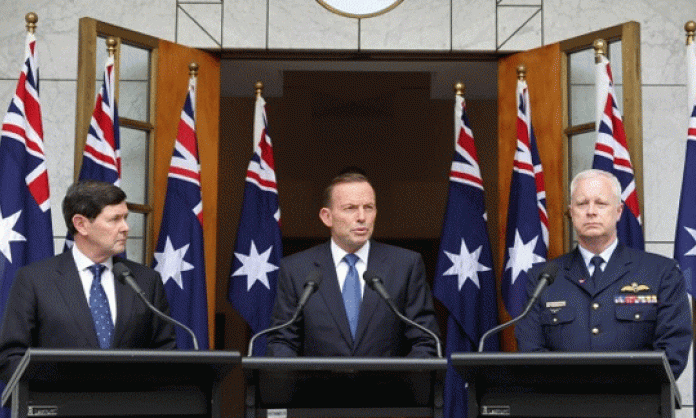Brazen assertion of the self-evidently ludicrous has long been core business for the right, and never more so than when it comes to the War on Terror,™ where the assumption that facts are a left wing plot is raised to the level of guiding principle.
In this regard, the latest round of mad statements by Israeli PM Benjamin Netanyahu and our own Tony Abbott are pretty much par for the course. Netanyahu’s declaration that a US-Iran deal will lead to Iran having “a vast nuclear arsenal” capable of “reaching every corner of the globe”, and Abbott’s belief that 300 Australian troops can train the Iraqi army to fight ISIS, are the kind of complete nonsense that can be refuted with a five second Google search. (Try “which Middle East country has nuclear weapons?” or “train Iraqi army success or failure”).
Which isn’t to say that a bit of unhinged rhetoric doesn’t go down well with the conservative rank and file, a not unimportant consideration if you are a discredited politician facing death by universal derision.
But there is much more at stake here than political job security. Australia’s (bipartisan) enthusiasm for redeploying troops to Iraq, and Netanyahu’s high-risk decision to in effect denounce the US president as a terrorist-appeaser from the podium of the US Congress, are both a part of the increasingly bitter debate in establishment circles about the Middle East strategy of the US and those in its close orbit.
This is not a clash of ideologies or values. In both camps utter cynicism rules.
One side is led by the White House and a large part of the US foreign policy establishment. They are desperate to end the cold war with Iran and normalise relations.
The regional disintegration that followed the Arab revolt of 2011, along with the fact that the Iranian regime is the single most important force prepared and able to confront ISIS and stymie the collapse of the Iraqi state, has turned vague musings about rapprochement with Iran into immediate White House policy.
On the other side are Israel and Saudi Arabia.
The Saudi position is pure geopolitics. Iran is Saudi Arabia’s chief regional rival. Saudi and Iranian forces and their proxies are in battle from the Gulf to the Mediterranean. Any reconciliation between the number one Saudi backer and Iran is by definition a blow against Saudi regional power.
The Israeli attitude is slightly more complicated. The only Israelis who seriously believe Iran poses a nuclear threat are those who will believe anything. It’s true that in Israel this is not an insubstantial portion of the population or even the political class. Nonetheless, the fear among serious Israeli strategists is not of an Iranian bomb but of a reduced US reliance on Israel. That is what Netanyahu was concerned about in his Congress speech. It was a demand that Israel be allowed to retain its place at the heart of US Middle East policy.
Not everyone in the Israeli establishment agrees with Netanyahu’s approach. Many fear, with some cause, that belligerent attacks on the US president are more likely to drive a wedge between the two countries than force the US into line. But as the rousing applause Netanyahu received in Congress indicates, there are more than a few who think that cheerleading for Israel is the first duty of every US politician.
Where does Australia fit into this?
Government-led hysteria about Islamic terrorism has been a recurring element of Australian politics since 9/11. The Abbott government, though, which rarely misses an opportunity whip up anti-Muslim prejudice, has been remarkably silent about Iran, the country Netanyahu describes as being on a “march of conquest, subjugation and terror”. Part of this is an attempt to whitewash the reality of what is happening in Iraq. Acknowledging that the rise of ISIS is a product of the vicious and bloody sectarianism of the Iranian-backed Shiite government in Baghdad, which itself came into being as a result of the calamitous US occupation, would undermine the depiction of ISIS as an unfathomable evil.
But it may go considerably further than that. It was recently announced that foreign minister Julie Bishop has scheduled an official trip to Tehran in April, which would make her only the second senior Western official to visit Iran in a decade.
According to the Sydney Morning Herald, the trip has the “enthusiastic backing of the White House”, which sees Australia as able to play an important role in facilitating a thawing of relations.
For the Australian government, there is also a considerable economic incentive. The Australian National University’s Amin Saikal told the Herald, “If there is a comprehensive agreement, Iran is going to open up, and it is going to be a big market for Australia and it is also going to be an enormous source of income for this country including through the participation by Australian companies in a lot of projects.”
So there you have it. The left has been campaigning against Muslim bashing and uncritical Australian support for Israel for years, with very little to show for it. At least now we can recognise the mistake in our approach. We foolishly based our arguments on a critique of racism and warmongering. It turns out what we really needed to do to get Tony Abbott to diverge from Israeli talking points and tone down his attacks on Muslims was to demonstrate there was a buck to be made.





